Then and now: 46 Winchester St., Bay Village

In 1954, 46 Winchester St. in Bay Village was home to the Latin Quarter nightclub.
Until very recently, it was an unassuming parking lot that doesn't look at all like the sort of spot that would play a role in transgender history and Boston's mid-20th-century reputation as a center of puritanical small-mindedness (and now it's nine-unit luxury townhouse):
The top photo was taken by a news photographer on Feb. 5, 1954 of what had started out as a Greek Orthodox church, then became a series of clubs starting in 1927. Of course, he wasn't just taking random street photos. Christine Jorgensen, perhaps the first transgender American to become famous, had been scheduled to appear there for nine days that month, following a show at New York's Latin Quarter.
Lou Walters, a Boston nightlife entrepreneur had started what became a chain of Latin Quarters clubs there in 1937, although he reportedly saw them more as restaurants with entertainment than nightclubs - he would often bring his young daughters, including Barbara, who later became famous in her own right.
By the 1950s, though, Walters had sold the club to Rocky Palladino of East Boston, famous mainly for his horse Little Beans, who went on to compete at Churchill Downs, although by the mid-50s, Palladino was periodically tied to organized crime, including Las Vegas mobster Mickey Cohen to whom he had loaned some money.
Palladino shifted the club into more of an entertainment venue than Walters. And he specialized in Italian-American acts - Frank Sinatra made his only Boston appearance as a solo performer there in 1953.
When word got out in January, 1954 that Palladino had signed Jorgensen to a nine-day contract at the Latin Quarter, official Boston lived up to its "banned in Boston" moniker and did everything it could to keep the show from going on.
District Attorney Garrett Byrne, already under pressure from a Senate juvenile-delinquency committee that was looking at Boston, tried to divert some attention by demanding the Boston Licensing Board revoke the club's entertainment license to stop what Byrne told the Globe was "a disgrace to every woman and man in America." He added, ""It would be a disgrace to the entire city if that freak show were allowed to go on."
Byrne even forced Palladino to testify before the grand jury he had set up to deal with the city's JD problem, told the Globe he had "called into Denmark" to demand answers on how Jorgensen got a sex-change operation there and demanded the American ambassador there be forced to resign for allowing the operation.
Palladino, meanwhile, defended Jorgensen and her act. "Christine has been a big hit everywhere and her act is in good taste," he said. "I saw her personally in New York before I booked her, and I liked the act."
Mayor John Hynes and the City Council joined in. Hynes called Jorgensen's imminent shows "a travesty on the entertainment business," while the council, referring to a city law banning female impersonators, voted to demand the licensing board order Jorgensen to undergo "a medical exam" to prove her gender.
Licensing Board Chairwoman Mary Driscoll at first went along, telling the Globe, "Christine is not an entertainer but a curiosity; he belongs in a museum, not in a night club, and certainly not in Boston." She briefly changed her mind, after seeing a copy of Jorgensen's passport, which identified her as "female" and that she was only concerned about somebody daring to be a female impersonator in the Athens of America.
But on Feb. 3, Driscoll and the other two members of the board suspended the Latin Quarter's entertainment license indefinitely.
Face with the possible ruin of his business - he would be out not only for the $7,500 he had agreed to pay Jorgensen but for even larger amounts he had agreed to pay a series of less controversial acts - Palladino pulled the plug.
Meanwhile, Jorgensen was already up in Boston that week to get ready for her show:
Checking into a hotel (source):
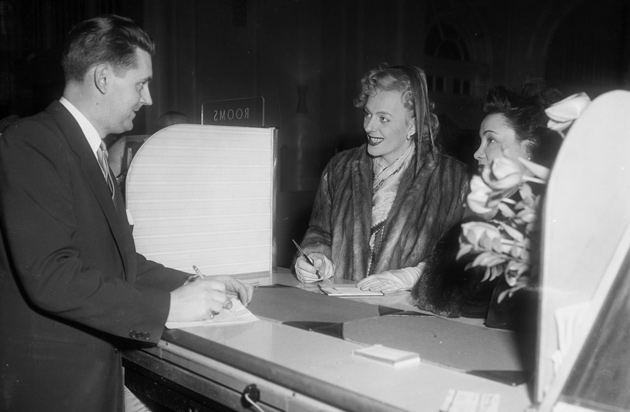
Seeing the sights, including the Boston welcome center (on the edge of the Common, source) and the Paul Revere House in the North End (source) - possibly for some "banned in Boston" publicity after getting word of her appearance's cancellation:
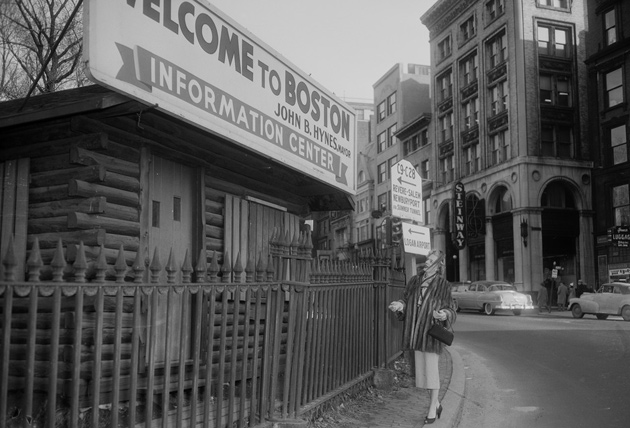
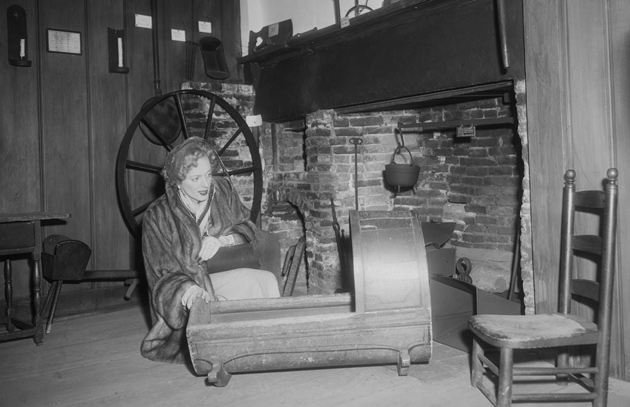
She also took time to freshen up (source) and get some coffee (source):
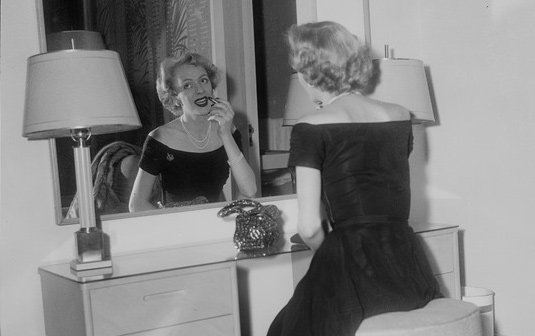
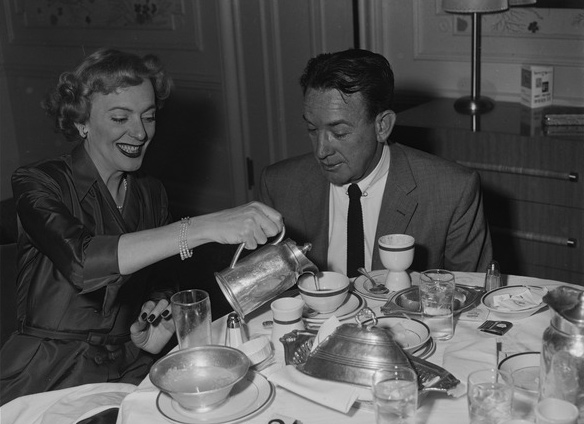
The Boston Latin Quarter closed in 1955. Richard Vacca writes it wasn't any controversy from the Jorgensen affair, but more simple economics - larger venues, such as Blinstrub's in South Boston, were able to attract bigger acts and keep their ticket prices relatively low.
Photos from the BPL's Brearley collection of press photography. Posted under this Creative Commons license.
Ad:

Comments
And yet ...
They probably all laughed at Milton Berle and Bob Hope in 1951:
Lou Walters
Lou Walters is Barbara Walters father.
She dedicates several chapters in her autobiography that came out several years ago about her time as a child and her father being a nightclub person in the 30s and 40s.
It was an interesting read about her and her relation to Boston's history prior to 1950.
I know she mentioned the Latin Quarter a few times. I wish I hadn't given away my copy of her book to someone.. that I never got back.. b/c now I want to re-read those chapters to see what she wrote.
There should be a website ...
Where we can troll people who don't return borrowed books.
thing is
I moved around the time I loaned it out. I remember it being in a box and moved. That was the last time I remember seeing it.
I remember lending it to someone but who I cannot remember.
The other thing is.. I had two copies of the book. One I was going to give to my grandma but she died before I had a chance to give it to her. Now both copies are gone.
Then And Recently. Not Then and Now
The parking lot was developed in the past two years.
https://www.jgarlandenterprises.com/1-17-edgerly-place
Ah, Edgerly Place, the private way in Bay Village...
...not to be confused with the two different unconnected segments of Edgerly Road, the public streets in the East Fenway.
Navigating Boston is such an adventure:-)
That'll teach me ...
I should've paid attention to the "2020" at the bottom of the Google Street View, grrr. Next time, I need to not be so lazy and actually go take the photo myself.
Thanks, I've left up the street view, because it was that way for such a long time, but added in a link to the condo project.
is that really "on the edge of the public garden"?
I think, from the angle of the photo and where the piano stores are, it's more likely the edge of the common, no? obviously across the street from the garden though...
It's neither
It's four blocks from the Public Garden (corner of Arlington and Boylston) - not super-long blocks, but it's certainly not "the edge of the Public Garden".
Haynes called her act a "travesty"
Was the Mayor an etymologist?
Also who put the burly in burlesque?
Her act
What exactly was her "act"? I recall Jorgensen from talk shows in the 1960s and found her to be interesting and, indeed, a pioneer. But what did she do as a nightclub performer? I don't remember her having any hit records or anything like that.
Various Show Tunes
Her theme song was "I Enjoy Being a Girl" from Flower Drum Song
I and a bunch of my title 9 girls refused to sing that in Junior High because it was so freaking awful, but I get how she might have embraced it.
Fate of the building
Do you know when the building was razed and why?
Welcome Center
It looks like the Welcome Center was on the Common, at the corner of Charles and Boylston. The buildings on the right of the photo are on the south side of Boylston, across from the Common, in the area called "Piano Row". The large one with the Steinway sign is the old Steinert Hall, until fairly recently home to M. Steinert & Co., piano retailers.
Google StreetView today, photo from June 2018: